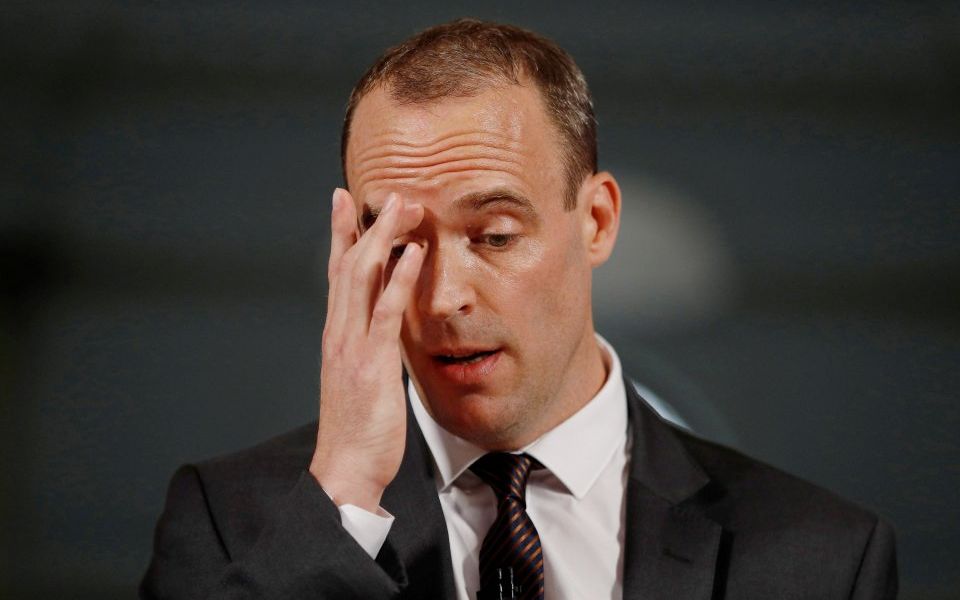Brexit papers draw battle lines for no-deal scenario

The government today warned businesses in financial services and beyond of the complicated processes and extra costs they may face in a no-deal Brexit, as it published the first in a barrage of technical notices to prepare for the scenario.
The government today published technical notices covering the possible consequences of the UK leaving the EU without a deal on 25 areas as diverse as the nuclear industry, the transport of blood across borders, and the effects on farming.
Cabinet split
Brexit secretary Dominic Raab attempted to assuage fears that the government would need to stockpile food and medicines – adding that the supply of BLT sandwiches will be safe and that the army will not be called in to secure food supplies. However, his efforts to address “misinformation” were undermined mere hours later by chancellor Philip Hammond warning of dire consequences from no deal.
Hammond sent a letter to a parliamentary committee today outlining a major economic hit to the UK if trade defaults to World Trade Organisation (WTO) terms under a no-deal scenario. He reiterated leaked government estimates which show that borrowing will be £80bn higher per year by 2033 as the economy shrinks.
Raab today told business groups in a Whitehall speech that no deal is “not what we want; it is not what we expect”, but that the government must prepare for the negotiations to fall through.
“I recognise the risks in the short term,” he said, adding that businesses will face “extra regulatory changes”.
The notices – the first of around 80 to be published by the end of September – told firms how to negotiate the extra red tape needed to navigate a no-deal scenario, but also highlighted significant areas in which solutions a chaotic Brexit could lead to a breakdown in goods and services trade.
City braced for disruption
The City’s top business groups today warned that no deal would be the worst outcome of negotiations, but nevertheless called for the EU to secure cross-border financial trade if talks do fall through.
The UK government has already committed to a temporary permissions regime (TPR) to allow EU financial firms to continue using the so-called passport to serve UK clients after Brexit. However, this move has not been repeated on the EU side, to the increasing frustration of British regulators and business groups.
For financial services, the government acknowledged a widespread collapse in cross-border trade if no deal is reached and trade defaults to World Trade Organisation terms, although it said firms “should continue to plan on the basis that an implementation period will be in place from March 2019 to December 2020”.
The government’s desired outcome of Brexit negotiations is a system of regulatory and supervisory cooperation which allows “autonomous decision-making” by both the UK and the EU.
Banks and other big financial firms in many cases have already moved jobs or applied for authorisations within the EU to protect against the possibility of no deal. Nevertheless, yesterday’s notices represent the most explicit statement by the government of the risks posed by a chaotic departure from the EU.
UK-based retail banks and investment banks will not be able to provide services to European clients “in the absence of action from the EU”, the financial services notice said. Investment banks “may be unable to service existing cross-border contracts” if no arrangement is reached.
More expensive payments
Payment services providers, including retail banks and payments firms, could be kicked out of central payments systems such as Target2 and the Single Euro Payments Area, meaning the cost of card payments between the UK and the EU will “likely increase” and a ban on extra card charges will also lapse.
Users face “increased costs and slower processing times” for euro transactions, the notice said, potentially rolling back recent progress and raising prices for British holidaymakers in Europe.
New temporary regimes will also apply to electronic money and payment institutions, registered account information service providers, and European funds marketed in the EU, the notices say.
The government has also committed to legislate to protect the status of financial contracts outside the scope of the TPR, a major concern flagged by the Bank of England.
VAT progress
Businesses were almost unanimous in welcoming a change to the treatment of value-added tax which is planned in case of a no-deal Brexit.
Under the plans, British VAT-registered businesses importing goods will be able to postpone the accounting for VAT until they complete their quarterly return, rather than paying import tax when goods arrive at the UK border. This will apply both to imports from the EU and non-EU countries, the technical notice said.
Without the step importers could have faced significant cash flow problems. Adam Marshall, director general of the British Chambers of Commerce, said the issue had been one of the biggest worries for firms. The government’s actions have “defused the time bomb”, he said.
Government preparations
The government currently has 7,000 people working on Brexit and the funding ready for as many as 9,000 extra civil servants, Raab said.
On the border, which is almost certain to face an increased workload, the government is currently recruiting another 300 new border agents in time for the exit data on 29 March 2019, and plans for another 1,000 after that.